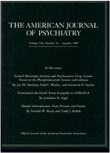The effect of changing thyroid function on cyclic affective illness in a human subject
Abstract
Thyroid function abnormalities are common in persons with rapid-cycling bipolar affective illness. Some women who cycle rapidly respond to thyroxine, but there is scant evidence that the people who have thyroid abnormalities are the ones who respond to thyroid treatment. The authors report successful thyroxine treatment of a man whose rapid cycling began and resolved after changes in his thyroid status. The period of his affective cycle was altered by both lithium and thyroxine. The authors suggest that CNS thyroid status may determine the clinical course of some persons with a fixed cycle of affective episodes.
Access content
To read the fulltext, please use one of the options below to sign in or purchase access.- Personal login
- Institutional Login
- Sign in via OpenAthens
- Register for access
-
Please login/register if you wish to pair your device and check access availability.
Not a subscriber?
PsychiatryOnline subscription options offer access to the DSM-5 library, books, journals, CME, and patient resources. This all-in-one virtual library provides psychiatrists and mental health professionals with key resources for diagnosis, treatment, research, and professional development.
Need more help? PsychiatryOnline Customer Service may be reached by emailing [email protected] or by calling 800-368-5777 (in the U.S.) or 703-907-7322 (outside the U.S.).



